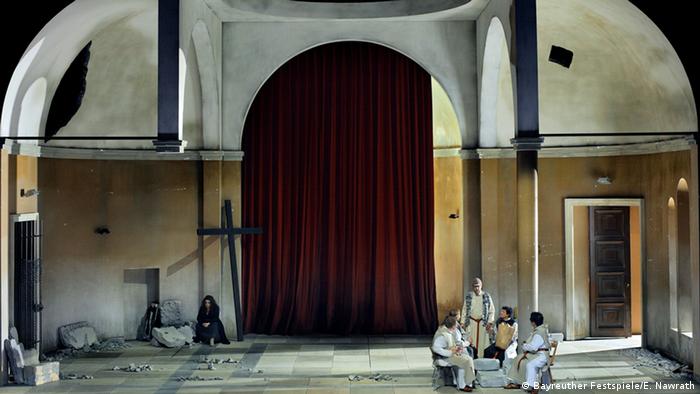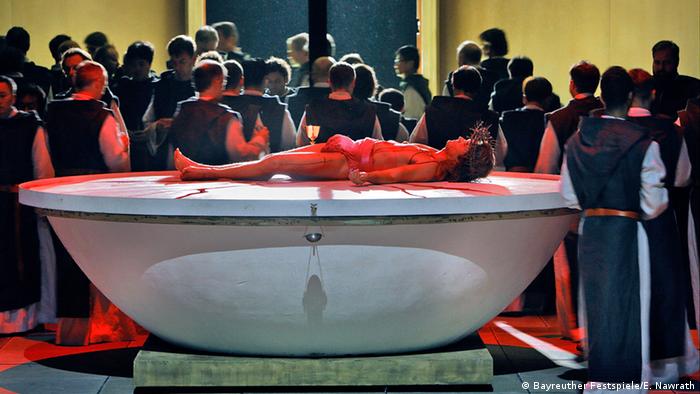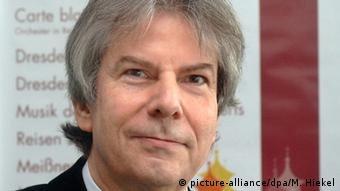Hartmut Haenchen: "A society without women is doomed"
Stepping in barely four weeks before opening day, he surprised the Bayreuth Festival Orchestra and its public. 73-year-old Hartmut Haenchen is clearly a maestro with a mind of his own, as revealed in a chat with DW.
Deutsche Welle: Your premiere was widely praised by the audience and the critics. How do you feel about it?
After an extremely short rehearsal period, everything came together. It was a sense of relief and gratification, musically and emotionally too. I was able to make a great deal of what I'd wanted happen.
Many were surprised by the swift tempos in your take on "Parsifal." How did the singers react?
It was a big readjustment for them, and not easy, because the stage direction had already been set. So we had to make some minor adjustments. But of course I didn't make any changes to the action, and you actually can't really see the stage from my position in the orchestra pit. In fact, the first time I saw the stage direction was on TV. That's unusual!
So you conducted "Parsifal" in Bayreuth on short notice but have studied the work long-term and intensively. What do you think is its message?
"Parsifal" clearly shows us that a society of men that tries to get along without women is disfunctional. Throughout Wagner's works you repeatedly see that only women are in a position to make positive change in the world - and that the men get it all wrong! He makes that clear in various ways and in various works, not only "Parsifal" but also "Tannhäuser," the "Flying Dutchman" and "Tristan."
The society of the knights of the Holy Grail in "Parsifal" is only maintained by ritual. But a society must actually be confirmed and proven through deeds. This community is thus doomed. Only an outsider who sees the problem can change something. The main protagonist, Parsifal, doesn't recognize it, but is made wise to the world through the actions of a woman, Kundry.
Now whether that really results in social transformation is an issue that Wagner leaves open. As in "Twilight of the Gods," there's just a shimmer of hope at the end, but no real solution offered. That makes this piece, "Parsifal," very topical - in the sense of religions stuck in their rituals and functioning only on an ideological level but ignoring basic human values. That's clearly a problem in our times.
As director Uwe Eric Laufenberg sees it in this production, the character of Parsifal transcends religions by subsuming them into a kind of meta religion of nature. Can you agree with that?
I didn't have time to work with the director on his concept. He explained it to me, and I came to terms with it easily enough. In a sense, he takes an approach that's critical to established religion. But unlike the director, I don't like to describe "Parsifal" as a piece about Christianity. I think Wagner makes clever use of symbols like the Holy Speer and the Holy Grail in order to make the piece understandable to ordinary people. They are simply the point of departure for his story - which also includes the Indian belief in reincarnation and elements of Buddhism.
What does Wagner's music have to say to us today?
Wagner is an important pillar of European culture, one worth preserving. His ideal is to promote and develop the arts with a vision of the future. In my opinion, some things that belong together have grown apart, with new artistic creation considered separately from old. They really should go together organically. That's what I appreciate with Wagner: he understands people as they are, speaks to them and takes them a step further.
For the sake of societal change and development?
Exactly! If we keep cutting back resources on culture, we'll end up spending ten times as much later on, repairing the damage to society. This isn't just about music. We have to develop, sustain and support the arts and culture in Europe in order to contain social problems, even criminality and drug abuse. As long as people are guided towards humanistic values - and here I'm talking about the ideals we once shared - then we're on the right path to preserving Europe.
But as I look around today, I'm worried about insufficient investment in education and youth theaters. Children have less access to concerts, and funding for music schools has been curtailed. In all these issues that are really critical for the future, political leaders are too short-sighted. With the modest means at my disposal, I'm trying to agitate for positive change here.
Does that include the integration of people from very different cultures into our own by means of music? After all, there's a big gulf between events like the Bayreuth Festival and the current refugee crisis. Is that too grand a vision?
The foreign element and the fascination with things that are different have always enriched European culture. And if there are disagreements on the issue, it's never been any different.
I was artistic director of the Dresden Music Festival for eight years, and one of the themes there was "Fasination for the Foreign." We brought together different musical cultures and showed how they cross-fertilize each other and create mutual tension. And we observed that music, which gets by without words and overcomes language barriers, is the best way to bring people together, to get them to join forces and understand each other. You really have to recognize that.
DW's Adelheid Feilcke spoke with Hartmut Haenchen.
<a
href="www.dw.com/en/hartmut-haenchen-a-society-without-women-is-doomed/a-19505781"
target="_blank">Ganzes Interview</a>


